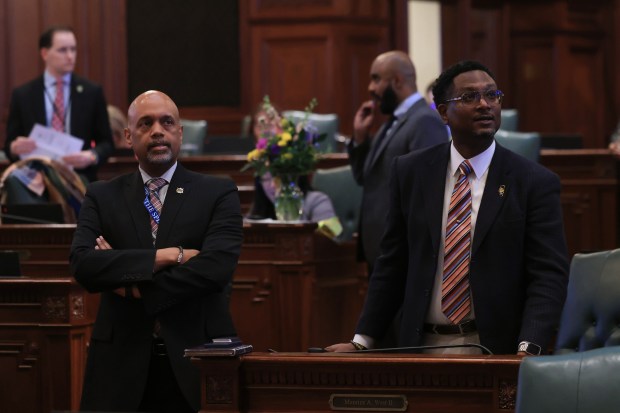Some novels feel not so much written as conjured, as though the author has absorbed something from the larger ambient culture and distilled it into the characters and narrative.
The result is like being put under a spell, an invitation to join some other mind in a shared dream. Not all books necessarily intend to do this, but when it happens, it can be a startling and powerful experience.
For me, “The Passenger Seat” by Vijay Khurana had this effect, and even days after finishing it, I find it invading my thoughts as though it has taken some kind of lasting root. On the surface, it fits with some of the present zeitgeist as embodied by the Netflix phenomenon “Adolescence.” “The Passenger Seat” is the story of a pair of teenage boys inexplicably and inextricably attracted to and undone by violence, but because we’re talking about a novel, rather than a television show, we have an opportunity to get much closer to these boys and that closeness becomes compelling and also unsettling.
The boys are Teddy and Adam, growing up in small-town Canada. Adam is something of an outcast, a lousy student, indifferently parented, and an apparent believer of certain “manosphere” tropes that alienate him from the girls whose attention he desperately craves. Their scorn is more agreeable than being ignored.
Good-looking Teddy is polite to adults and comes from an intact home (though his mother is having an obvious affair) with an older sister on her way to college. He has a girlfriend he is constantly worried about alienating, not knowing what’s expected of him by her or the world. It’s not clear why he is attracted to Adam beyond the fact that each boy senses a kind of unconditional acceptance from the other.
Almost, but not quite spontaneously, Adam and Teddy take off in Teddy’s truck, heading north, maybe to the arctic, maybe to just get out of town for a bit. Adam is the one with the driver’s license and the vehicle, while Teddy has the gun safety course permit, which allows him to buy a hunting rifle on their way out of town.
Once the gun shows up, I was reading the novel through (metaphorical) parted fingers waiting for its use, and when the incident happens, there is a sinister scrim over every moment. These are not two romantic outlaws being free but a couple of doomed boys. Or maybe they’re men. When referring to the pair, Khurana uses a repeated incantation “these boys, or men,” suggesting the liminal space Adam and Teddy occupy, the confusion both the reader and they themselves have over their identities.
The close third-person narration, which swings between Adam and Teddy section to section, deftly reveals the conflicts that roil within them. The story is empathetic to these characters without being sympathetic or exculpatory of their actions.
I particularly admired a closing section which serves as a coda, told from the point of view of a truly peripheral character that at first feels disorienting, but by the end reveals a kind of core fragility of the male self that apparently makes it so vulnerable to both self-sabotage and the destruction of others. The novel’s conclusion is both quiet and searing.
There is simultaneously no explanation and a million explanations for the actions of these boys, or men. If anything, the shorthand marketing copy of “a searing examination of male friendship and masculinity in an age of toxic loneliness” gives short shrift to what’s happening here.
This is a novel about not just these boys, or men, but the world that gives rise to them.
John Warner is the author of books including “More Than Words: How to Think About Writing in the Age of AI.” You can find him at www.biblioracle.com.
Book recommendations from the Biblioracle
John Warner tells you what to read based on the last five books you’ve read.
1. “The Lost Tomb” by Douglas Preston
2. “The Second Sleep” by Robert Harris
3. “The Indian Card: Who Gets to Be Native in America” by Carrie Lowry Schuettpelz
4. “The Premonition: A Pandemic Story” by Michael Lewis
5. “The Screwtape Letters” by C.S. Lewis
— Jim H., Norridge
Here’s a book I haven’t thought about in quite a while, but whose mystery and quiet, but powerful emotion feels right to me, “Out Stealing Horses” by Per Petterson.
1. “Untamed” by Glennon Doyle
2. “Big Magic: Creative Living Beyond Fear” by Elizabeth Gilbert
3. “The Business of Being a Writer” by Jane Friedman
4. “The Turnout” by Megan Abbott
5. “The Girl on the Train” by Paula Hawkins
— Liza P., Chicago
Looks like Liza might like something rich with suspense: “Little Pretty Things” by Lori Rader-Day.
1. “James” by Percival Everett
2. “More Than Words: How to Think About Writing in the Age of AI” by John Warner
3. “The Wedding People” by Alison Espach
4. “Dream State” by Eric Puchner
5. “The Brothers Karamazov” by Fyodor Dostoevsky
— Allison T., Gurnee
Given the impeccable taste of this reader, I better come through with a good one: Here’s a strange and wonderful book, “May We Be Forgiven” by A.M. Homes.
Get a reading from the Biblioracle
Send a list of the last five books you’ve read and your hometown to biblioracle@gmail.com.



